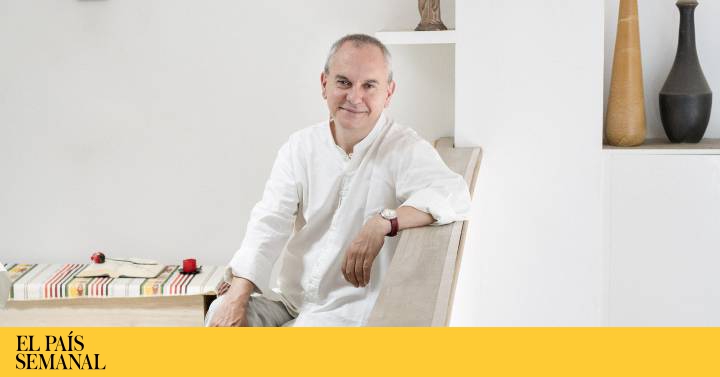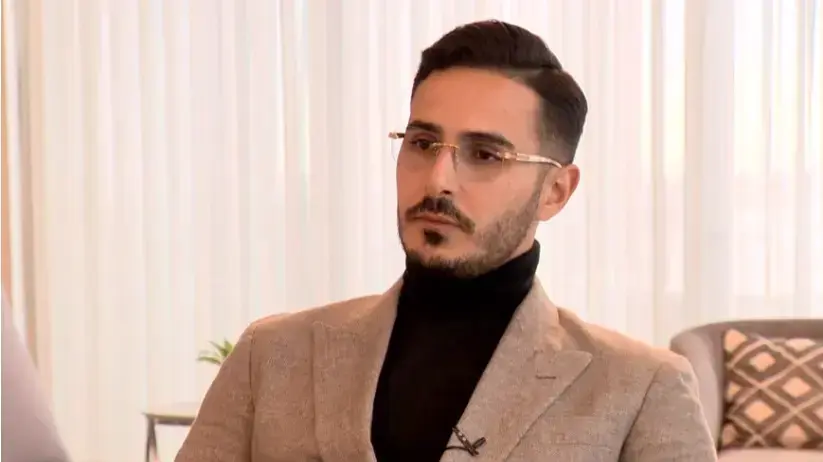Someone gave him a nickname of dubious taste: "the Woody Allen of meditation." Okay, the same could have been "the Messi of silence." None of this is worth more than to reduce to anecdotal a polyhedral and paradoxically loquacious type like Pablo d'Ors (Madrid, 1963). The grandson of the thinker and writer Eugenio d'Ors continues to sell copies (already more than 200,000) of his great success, Biography of Silence (originally edited by Siruela and today by Galaxia Gutenberg, who currently recovers and reissues all his work and who will publish his next book, Essay on light). And today a new meditation retreat begins in the Batuecas Valley, accompanied by 10 members of the animating meditation group, Amigos del Desierto. It is the fast-paced activity of a calm man who thinks, contemplates, studies, prays, reads, writes, travels, speaks and - when he plays, which is often - he is silent. A sin the latter, in times like this.
Coming here was a huge billboard with this phrase: "They lied to you: it is very easy to find happiness." What does this suggest to you?
I am not interested in happiness, but in fulfillment, which is different. You may be walking emphatically toward your fullness and not be particularly happy. There are many proposals for happiness, but we associate it rather with well-being. And that's the catch, that's the lie. I would like to introduce the term "bienser", versus wellness. It assumes that we have not only instincts and desires, but also a longing. Instincts obey the body; desires, to the mind, and longing, to the soul. You may have instincts and desires, but if you lack the desire ...
With the dead of the pandemic and its terrible impact we can no longer do anything ..., perhaps with the lessons to be drawn yes. Or not? Do you think that you can learn from what happened and change things, or do you think, like some, that it is a matter of preachers?
I must be a preacher. Because I do believe that we can learn from what we have lived, and I do believe that it can be formulated in this way: extract lessons. The most interesting thing in life is learning. Insofar as we have a discipling attitude, that is, one of receptivity and humility, life is interesting. Humility is the starting point and the ending point. What prevents us from being humble and receptive are our prejudices. Reality is not in the first instance to be changed, but to be lived. The first thing we have to do with the experience of the pandemic is to really live it, that is, not to turn a deaf ear, not to turn the page, but to look it in the eye.
Perhaps the pandemic has even more shooting power as a teaching because it is a tragedy. Tragedy is really powerful teaching, the Greeks discovered it about 2,500 years ago ...
Because the positive turns us outwards while the dark sends us inwards. And I don't think that nothing can be done with those who have already died or with those who have lost loved ones. Some can be remembered and the others can be accompanied. I was wondering about the tragedy. What puts us in question we want to avoid, but it also forces us to think, to elaborate, to find what to do with it. Normally, what we face in the face of tragedy is either to escape - we are masters of the flight - or to try to resolve it, given that today's human being has a rather pragmatic mentality, which always wants solutions. And let's see, if something can be solved, resolve it, but something of the magnitude of this pandemic is not simply a matter of resolution, but rather of dissolution.
What does it mean exactly?
It means learning to live with them ...
Dissolving in them means that tragedy is tragedy and that it will not cease to be, no matter how hard you work inside yourself. But if it is going to lose its poison, it is going to stop having a destructive resonance in you, even if it continues being part of you. That job is to look benevolently at the dark. In this case, the tragedy dissolves. If you look at it with anger or despair, you enlarge it.
The virus came, we went into our houses and we had the healthy temptation to collect ourselves , to be with ourselves. But immediately we apply ourselves to fill it all with noise: chats, concerts on the balconies, baking tutorials, appetizers for video calls, records, series, movies ... In other words, more than living time, we apply ourselves to killing time, when He often says that what we lack most is time.
The subject of time is a mirage. There really is time. Another different thing is how we use it. If you really want to know what someone believes in and where their heart is, look at their calendar and schedule.
Twenty-four hours seven days a week is enough, indeed ...
Yes, but the point is that we are in a culture of performance zeal. That means that we value things not for what they are, but for what they produce. In fact, we always ask, "What is that for?" Something is worth today if it produces. This makes us live with unnecessary tension, convinced that time must be used. But it is not that you have to take advantage of it, but live it, which is not the same. That desire to squeeze is what kills us and what puts important doses of unhappiness in our lives. It is not about living in absolute emptiness, of course; but yes to grant small spaces to the emptiness. For what? To learn that being is not identified with doing. We have made a myth of thought and action, but the human being is not reduced to thinking and doing, there is something else called, instead of thought, contemplation, and instead of action, passion. Passion in the double sense of passivity and suffering. Things have to touch us. And if they touch us, some hurt us.
By speaking of passivity, I understand that you speak of listening to the other, of that notion of attention that Simone Weil wrote and spoke about. But there are no good times for that.
I define listening as receiving what the other tells you without intellectually or emotionally loading it. As you add your own thinking or your own emotion to what they are saying, you no longer really listen. So many of our conversations are simply reactive. And it is what happens in our society of extraversion, of the always out: that if you remain silent and listening, they say to you: "But what is happening to you?"
Shouldn't the ability to speak in public and, at the same time, to know how to listen, prevail in the education of children and adolescents?
Well, meditation is that: a school of listening to oneself. Listening to oneself is what makes it possible to listen to others, for the simple reason that nobody can give what they don't have. As society has grown in stimuli, and especially in the immediacy of these stimuli, we are increasingly in need of education in care. Today, the threat posed by dispersal is much greater than it was years ago. What is dispersion? Be everywhere and, really, nowhere. And what is meditating? Learn to be in a place.
There are people who, if they are here, want to be there and, if they are there, they want to be here. That distress is terrible for them and for their environment.
The fascination with tourism works this way. It is a bit like a check list: I have already done this, I have already been there… It is the eagerness to live, instead of really living.
Yes I am. We are overstimulated. And when we are not, we already worry about looking for resources to avoid the vacuum. Why does emptiness scare? Because it reminds you of who you are. The outer void — a free Sunday afternoon, for example — is a mirror of the inner void. And that makes us dizzy, because where there is nothing there can be ... anything. Emptiness is the ecstasy of possibility. And we fled from that total opening.
If meditation is listening to yourself, is it also confrontation?
Of course. Peace, which is one of the fruits of meditation, is not idyllic, but a peace resulting from combat. You have fought yourself and come to the light after going through the darkness. That involves many things: the anxiety, the inability to support oneself, all the unconscious that is emerging, all that Jung called the shadow, the famous inner demons ... All that must be looked at lovingly to exorcise him.
But all that happens in dreams too.
It is that they are very similar. What meditation is most like is sleep. They are the two sources through which the unconscious comes to the surface. Whenever there is talk of meditation, many believe that it is something mysterious and difficult. On the contrary: it is daily and elementary, a simple and possible practice that involves only the desire to know yourself and to dare to look at what there is, whatever it is.
One of the goals of meditation is supposed to be to see yourself without filters. What if you don't like what you see?
Well, it is the most normal and the most interesting thing.
Sure, if you love yourself, why meditate.
Clear. Self-congratulatory ones are the dumbest.
But if you look and don't like yourself, what do you do, do you take action?
No, because you would already be entering a different, pragmatic logic. If then you, in your daily life, want to take measures to improve, then take them, but in meditation itself, you should not set your goals.
Whoever is reading this and thinks something like "what are you talking about, who cares about these things", what would you say? Do you miss it
All this that is coming out here may seem like a lucubration, but it is deeply elemental. The spiritual is elemental. What I always want to talk about is looking, listening, walking, eating, sleeping ... Happiness - or fulfillment, as we said before - consists of consciously carrying out all these daily activities. Maybe there are people who do not enter the reflective level of this speech, that does not matter. Just as not everyone likes all kinds of movies or literature. But you don't have to look at what you say as much as what you are. We can say many things and be very few.
Well, a long list of characters could come out here who say a lot of things knowing that they will never do them ... Quite a few of them are politicians.
They are cynics. Well nothing, worse for them. I understand the intellectual position of cynicism, but it seems ethically inadvisable to me.
You have argued that around 80% of the intellectual work we carry out is expendable and, worse, counterproductive.
Yes, I firmly believe so.
And what opposes you? In other words, what does it pose against the intellectual framework?
The intellectual framework reveals what is fear of life. We are mentally equipping ourselves to have a defense mechanism and not have to deal with what life is presenting to us. Many times thinking prevents living. Thought is not bad in itself, but sometimes, if it is a victim of ideology, of course it can be. It is not bad to be an intellectual, the bad thing is to be an intellectualist, that is, to want to subject everything to the machine of reason. Not everything enters the rational route, the intuitive and the visceral also have their legitimacy.
Well, there are people who move like fish in water in that intellectualist sphere, and even live from it. They tend to look people up and down and they are an elite, or think they are ...
Let's see, the important thing here is to distinguish between the intellectual and the wise.
That was the next question.
The intellectual is the one who wants to penetrate reality to understand it. The sage is the one who allows reality to enter him. It is very different. One has a more active attitude and the other a more receptive one. Science advances thanks to the fact that there is a willingness to enter, so there is no need to demonize that attitude, you just have to say that it cannot colonize everything. There are many dimensions in the human being and all have their legitimacy. There are reasons that reason cannot understand, reasons of the heart, of the body ... The wisdom of the body is a pending issue.
And in that mind / guts opposition, or thinking / staining, is it possible to place the old distinction between the artist and the craftsman, often so respected one and so despised the other?
Anyone who engages in art knows that it carries a huge craft dimension. You can have great ideas for writing a book, but then you have to have a profession to write it. Not everything is inspiration. Unless you are a genius like Mozart, where it seems that everything is inspiration, the creators have a little inspiration and a lot of perspiration. Art is manual work. We write with our hands, we paint with our hands ... Writing is manual work, not mental. I don't have an idea and I write it, but I write it and I find the idea.
Well, that seems like a statement from the automatic writing of the Surrealists, rather than from the literary profession in general ...
Not only. If you only write what you think, in the end your focus is on communication. But art is not simple communication, art is revelation. Not only do you tell something to others, but you discover it yourself. This is what makes art fascinating. If you think you know everything, why do you write? The worst of vices is pride.
Speaking of pride: why is the problem always the other?
There are real experts in throwing the ball out and shaking off the dead. The sage's attitude is the opposite: instead of always pointing the finger at the other, the sage always points at himself: how can I help in this? It would be better if the arrows were always aimed at us. So we would target once in a while.
Well, that seems to be the antithesis of what happens in politics, in Spanish of course. The fault lies with the other all the time.
It is normal. When you point to yourself you appear weak to others. When you point at the other, instead, you appear strong. And weakness does not have a good press.
However, when a politician says he has made mistakes, that echoes in the people. Deep down, making mistakes is a good political marketing operation, don't you think?
It is that the weakness of others is reminiscent of your own. It can make us feel sorry that a politician says that she has made mistakes because she reminds us that we also make them.
Don't you think that this perennial “it's your fault” revitalizes every day the figure of the Greek idiots , of that disaffection with public things for the benefit of individualism?
In the world in general individualism grows and social sensitivity is lost. The public continually loses ground to the private. Many people have been fine in this confinement because they have been in their hole. But just as it is good to do the interior experience, it is also good to go out into the public square and intervene. It can't be that everything is receiving, you have to give. Yes, there is an exacerbation of individualism, to the point that ethics and solidarity are well packaged to make it another consumer product, but I do not know to what extent it is truly mobilizing.
This self-conviction of "the problem is the other" is not only lived by politicians. We all live it to a certain extent. In that sense we are quite hypocritical, right?
I don't know, I can speak only about what I live. Of course the others have their problems, of course. But Gandhi said that our contribution to the progress of the world must consist of putting our own house in order. What really matters to me is what I do with myself, that is my framework, my possibility of contributing to making the world better.
In fact, you have ever charged against what you call "altruistic ideology." That ties in with environmental goodness, with experts in saying what they touch every day and with professionals who issue purity cards.
Perhaps it is difficult to be in the public in an intense way and not lose the roles of one's dignity. When you have to speak permanently, for example, it is easy to say a lot of stupid things. When time is found to be silent, they say less. I am going to put an example. I have known priests who were great people. As soon as they were appointed bishops they became rare. Power is always dangerous. The sages generally stay away from him, or at least heavily armored in front of him. It's like success: it takes you away from people.




/cloudfront-eu-central-1.images.arcpublishing.com/prisa/MDIOKAISMOMPFW6N7JYHFUNE4M.jpg)



/cloudfront-eu-central-1.images.arcpublishing.com/prisa/WE43TR57LVAJBIBO5CB3WYK5LU.jpg)





